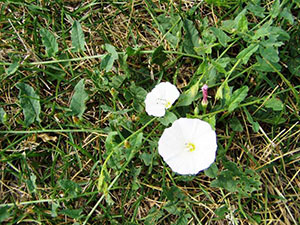
Field bindweed (Convolvulus arvensis) is a common problem in Colorado lawns. Bindweed and other common weeds don’t like the competition they face in a dense, healthy, well cared-for lawn. But this deeply-rooted perennial member of the morning glory family will quickly take over the unhealthy, malnourished lawn, or those lawns suffering from drought stress or poor irrigation coverage.
How do I control bindweed?
The first steps towards controlling bindweed in lawns include providing adequate nitrogen fertilization (2-4 applications during the year, depending on turf species and age of the lawn), timely and uniform irrigation, and mowing the lawn in the range of 2½ to 3 inches. These practices alone can substantially, over the course of a couple of years, reduce the amount of bindweed in a lawn. Bindweed can be more quickly controlled when proper management is combined with judicious herbicide use. Pre-emergence herbicides are useless for controlling bindweed. Because of its very deep and extensive root system, systemic post-emergence products must be used.
What herbicides control bindweed?
Bindweed survives many herbicides that kill other plants. For example, 2,4-D is largely ineffective against bindweed if used alone. Three-way mixtures containing dicamba or dichlorprop (combined with the standards 2, 4-D and MCPP/MCPA) can provide moderate to good control.
Which herbicide is the most effective?
The herbicide quinclorac is highly effective at controlling bindweed. Quinclorac is also a component of a few professional products. Quinclorac is available to the homeowner in the products Ortho Weed B Gon MAX plus Crabgrass Control and Bayer Advanced ™ All-In-One Lawn Weed and Crabgrass Killer. Remember that these herbicides are labeled only for use in lawns and can’t be legally or safely used in landscape beds or vegetable gardens.


